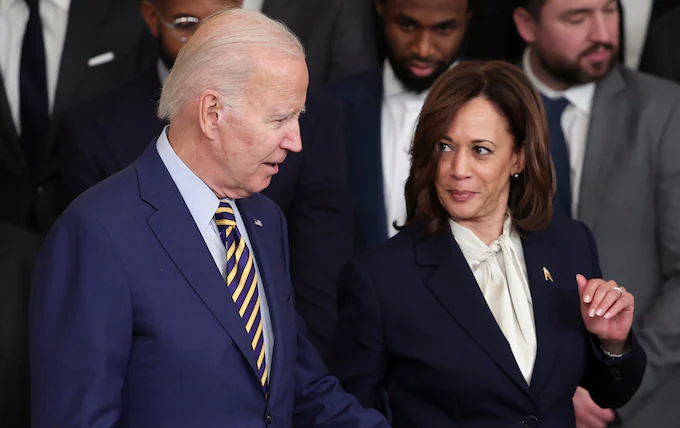The U.S. economy added fewer jobs than anticipated in August, signaling a slowing labor market and potentially setting the stage for the Federal Reserve to reduce interest rates later this month, along with bad news for Kamala Harris. Nonfarm payrolls increased by 142,000 in August, up from 89,000 in July but falling short of the Dow Jones consensus forecast of 161,000, according to a report from the Labor Department’s Bureau of Labor Statistics released on Friday, according to CNBC. At the same time, the unemployment rate ticked down to 4.2%, as expected, but there is more to that number than meets the eye.
The labor force grew by 120,000 in August, contributing to a tiny percentage-point drop in the unemployment rate, although the labor force participation rate remained steady at 62.7%. An alternative measure, which includes discouraged workers and those working only part-time jobs, rose to 7.9%, or the “real” unemployment rate — the highest level since October 2021. The household survey, which calculates the unemployment rate and tends to be more volatile than the establishment survey, indicated an employment increase of 168,000. However, the growth was predominantly in part-time jobs, which rose by 527,000, while full-time employment decreased by 438,000.
Although the August job numbers were near expectations, the previous two months saw significant downward revisions. The Bureau of Labor Statistics adjusted July’s total down by 25,000, and June’s figures were revised to 118,000, a reduction of 61,000. These reductions come after the Biden-Harris administration admitted that real job growth over the past couple of years was nearly 900,000 fewer than previously reported. “I don’t like this a whole lot. It’s not disaster, but it’s below expectations on the headline, and what really bothers me is the revisions,” Dan North, senior economist for North America at Allianz Trade, told CNBC. “This is certainly going the wrong way.”
The outlet added:
The report comes with markets on edge over the next step for the Fed, which has been on hold with rates since July 2023 after having enacted a series of sharp increases to bring down inflation.
Heading into the release, markets had been pricing in a 100% probability that the Fed will start cutting rates when it meets Sept. 17-18. The only question was how much.
Following the payrolls release, futures market pricing briefly tilted towards a half percentage point cut but then switched back to a quarter point, according to the CME Group’s FedWatch gauge.
“For the Fed, the decision comes down to deciding which is the bigger risk: reigniting inflation pressures if they cut by 50 [basis points] or threatening recession if they only cut by 25 [basis points],” Seema Shah, chief global strategist at Principal Asset Management, told CNBC. “On balance, with inflation pressures subdued, there is no reason for the Fed not to err on the side of caution and frontload rate cuts.”
In a speech Friday morning, New York Fed President John Williams endorsed rate cuts. “With the economy now in equipoise and inflation on a path to 2 percent, it is now appropriate to dial down the degree of restrictiveness in the stance of policy by reducing the target range for the federal funds rate,” Williams said in remarks before the Council on Foreign Relations in New York.
For her part, Harris’ economic proposals thus far have been criticized by both left and right as being wholly unworkable and devastating for the economy. Her most comprehensive proposal yet—a staggering $5 trillion in tax increases over the next decade—led to her plan facing immediate and intense criticism. The proposal, which aligns with Joe Biden’s spring budget, aims to generate billions by taxing everything from corporate profits to unrealized capital gains. However, CNBC’s co-hosts clarified that the proposal is far from a sure thing. During a late August segment, hosts Becky Quick and Joe Kernan sharply criticized Harris’s economic advisor, Bharat Ramamurti, calling the idea of taxing unrealized gains “nothing short of lunacy.”
“Unrealized gains, taxing unrealized gains just doesn’t seem fair in any sense of the word,” Quick fired off during the exchange. “In the very best sense, if you are taxing unrealized gains, all you’re doing is pulling forward the taxes that would be paid later when someone actually sells the stock.” Ramamurti’s response was a tone-deaf analogy that fell flat. “I think this reaction to unrealized gains is a little funny,” he said. “The majority of people watching right now are already paying a tax on unrealized gains. It’s called a property tax. When the value of your home goes up, you pay higher taxes even if you don’t sell your home.”
Quick, however, fired back, “The value of your home never moves the way a stock moves, the way something else moves.” Ramamurti then tried to justify the tax to fund essential services, claiming it would “create more opportunities” and ensure “every newborn in this country gets $6,000.” But the co-hosts weren’t buying it, and Kernan summed up the proposal this way: “It’s probably unconstitutional, and it was never in anyone’s intent to do.” He added: “And it’s never going to happen. Not in my life. Not in Becky’s life.”



